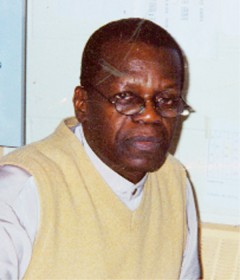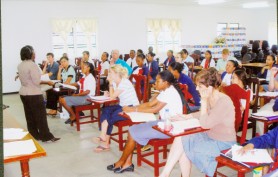Issues and challenges in the new academic year (Cont’d)
By Dr Leyland Mason
As happens every year in September and October, Education Month and International Teachers’ Day will be observed in 2009. When these signal events occur this year, and in the future, there should be greater emphasis on celebrating the efforts our teachers are making now, and must of necessity expend in future years, to educate the nation’s students.

The role of teachers is a crucial, significant factor in the development of our people and our national economic thrust for an improved livelihood and society. Improving the efficiency of schooling is largely a consequence of the efforts of competent teachers whose high-quality teaching is accessible to students they can influence to become self-directed learners, and who are able and motivated to continue learning over their lifetime.
Clearly, the quality of the school system is influenced by the quality of training student teachers undergo. Continuing professional development is also an important contributor to the degree of excellent work practising teachers produce with the students they teach. The trainers at both levels must ensure that the trainees in such programmes are able to:
a. show knowledge of the processes of learning, development, and can support the intellectual, social, and personal development of the children they teach;
b. exhibit knowledge of content in their specialist subject area;
c. demonstrate knowledge of the processes of learning, development and the opportunities to further the intellectual, social, and personal development of children under their tutelage.
To perform these functions proficiently, the professional training teachers undertake should

enable them to perform expertly as
(i) Clinical/practical teachers: The clinical process is an apt occasion for the acquisition of information immediately pertinent to teaching practice. Expert clinical teacher trainers can share their reflections of teaching with their students, assisting them to clearly understand the particulars of clinical decision making.
(ii) Role models: The teacher, as a role model, must exemplify what is to be learned so that his/her students can acquire the understanding of not only what their teachers say, but also what they practice. In ‘1’ such an exercise, the teacher seizes the unique opportunity of “, sharing some of the charms of the subject with students who can acquire the knowledge, skills, and dispositions their teachers display.
(iii) Learning facilitators: The role of the teacher involves a student centred approach in the teaching act. The teacher is increasingly recognized as a facilitator of student learning.
(iv) Mentors: This is an additional role for the teacher. It tends to be focused on issues relating to the student as a person, rather than the student’s performance in a subject or an examination.
(v) Student Assessors: This entails an evaluation of the student’s performance in a subject or an examination. Assessment of the student’s competence is a very important task for the teacher. It can be a separate role since not every teacher is an expert examiner.
(vi) Curriculum Assessors: Teachers are responsible not only for planning and implementing educational programmes, and assessing student learning. They are also expected to assess the course and curriculum delivered. They are duty bound to monitor and evaluate the effectiveness of the teaching of courses and curricula. This responsibility (evaluation) is now an essential part of the educational process. It can also be seen as a necessary component of the professional role of teachers, acknowledging teachers’ own responsibility for monitoring their own performance.
(vii) Curriculum Planners: Teachers are expected to make a contribution to planning a curriculum for their subject specialization. It can make significant demands of a teacher, since both time and skill are required if the exercise is to produce a document of exemplary quality.
(viii) Course Planners: The most relevant curriculum can be inefficient if the courses developed from that document have scant relationship to it. After principles which support that curriculum have been accepted, careful attention must be paid to the detailed planning necessary at the level of the derived course or phase.
(ix) Resource Developers: There is an increasing need for creators of learning materials. New technologies have widened the general make – up and use of materials to which students have quicker access. This facilitates their increased responsibility for their personal education. Teachers must acquire several skills needed to choose and produce materials they can beneficially use in their classrooms.
(x) Study Guide Producer: The ownership and use of individual study guides by students in upper primary grades and secondary schools is a responsibility of practising teachers. These guides can be suitably prepared in electronic or print form. They are intended to be the student’s personal tutor, are available all the time and designed to assist each student with his/her learning. They provide students with information about what they should learn – what are the expected learning outcomes of the course, how they can acquire the necessary competences – the learning opportunities available, and whether the students have used such occasions for their own benefits.
Conclusion
The above list details ten (10) key roles that teachers are required to enact in their classrooms and schools. Effective performance of these roles can help teachers become more competent in their work, and can assist them and their schools to improve student learning and performance.
While each of the roles is described separately, they are, in classrooms and schools, closely connected, and can even be grouped. Individual teachers may be given the opportunity to practise some roles simultaneously, but an effective teacher need not have to be competent in all of them. Human resource planning on the part of effective school leaders should match teachers in the roles for which they have the greatest abilities.
There are possibilities here for hiring, training, and assigning teachers to teams. Teacher orientation to these roles and their enactment should commence in initial teacher training programmes, and continue in the classrooms. Effective educational leadership can then rally such teams to help upgrade the quality of teaching, and to improve student performance.
In Septembers and Octobers to come all stakeholders in the education of our students may display increased emotional engagement in the celebration of the efforts of our teachers and students.





